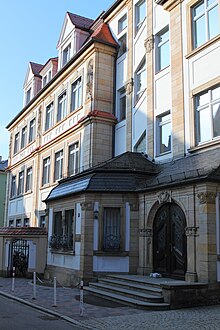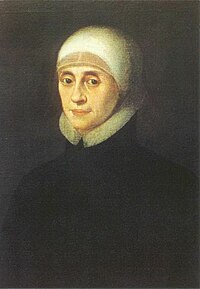Maria Ward
Maria Ward ( English Mary Ward , born January 23, 1585 in Mulwith near Newby , Yorkshire , † January 30, 1645 in York ) was an English religious sister and founder of the Roman Catholic Church . She founded the “ Congregatio Jesu ” and paved the way for better education for girls. Numerous schools bear her name. On December 19, 2009 she was welcomed by Pope Benedict XVI. was awarded the honorary title of Venerable Servant of God , which is an important stage in the beatification process .
Life
As the daughter of a country gentleman , Maria Ward grew up in Elizabethan England at the time of the Catholic persecution . In 1587 Queen Elizabeth I of England had her Scottish niece of the second degree, the Catholic Maria Stuart , executed because she saw her rule threatened. During her reign, numerous Catholic priests were executed and participation in Holy Mass was made a criminal offense. Many English Catholics, including the Ward family, practiced their faith in secret. Maria Ward saw three relatives executed for their beliefs and others imprisoned and tortured. Her grandmother, with whom she lived for a long time, had to spend 14 years in prison. In 1601 Maria came to her relatives, the Babthorpes, where the desire for religious life was awakened in her. So she refused to marry Edward Neville , the great hope of the Catholic Party.
In the meantime, after the death of Queen Elizabeth in 1603, the Scottish King Jacob came to the English throne. The son of Maria Stuart had been brought up Protestant and disappointed the hopes of English Catholics for a relaxation of the anti- denominational legislation. In 1605 the so-called powder conspiracy came about , during which a group of fanatical Catholics led by Guy Fawkes wanted to blow up the king, his family and the entire parliament. After their plans were exposed, all Catholics were forced to take an anti-papal oath of allegiance and were excluded from public office.

In 1606 Maria Ward entered Flanders as a postulant in the monastery of the Poor Clares of Saint-Omer . Although it as a choir woman was about to enter, she was a lay sister picked up and sent out to collect alms. She was physically unable to cope with the harsh living conditions of a lay sister. After weeks, a clergyman allowed her to leave. From her fortune, she founded her own monastery in Flanders only for English women, in which the rule of the order of St. Clare was strictly applied. After a while, Maria Ward realized that this was not her way. She left the monastery, went back to England and arranged illegal contacts between devout Catholics and priests at risk of death. She was sentenced to death once for this, but was released.
Foundations
A group of girls joined Maria Ward. Together they went to Flanders and took English Catholic girls with them as their pupils. The “Institute of the English Misses” should correspond to a Jesuit -influenced life for women and therefore take over the rule of St. Ignatius of Loyola . This form of religious life - women who pursued an apostolate outside of the cloister - aroused annoyance because the members of the community behaved like nuns in their institute , but at the same time moved freely around the city.
Maria Ward went to Rome to have her religious rules confirmed , where the sisters also taught girls. But because they in the interest of pastoral care the rules on the exam would not be aware they had to leave Rome and moved the time of the Thirty Years War under the protection of Elector Maximilian I of Bavaria . Maximilian I. made it possible to build a monastery and to open the first educational institution for girls in Munich. In 1627 the first girls' school for the English ladies was set up in the "Paradeiser-Haus" (at today's Marienhof behind the town hall).
In 1631 Pope Urban VIII dissolved the entire association; Maria Ward herself was imprisoned as a heretic for nine weeks. The inquisition judgment ended with their justification , but their community remained suspended. In 1635 the official approval of the Munich girls' school was given by Elector Maximilian I.
In 1639 Maria Ward traveled to her English homeland for the last time, where Catholics were still persecuted. She died in York in 1645. Her headstone is in a small Anglican church in Osbaldwick near York.
Institute of the English Misses

The Pope did not recognize the Congregation of the English Misses until 1703, more than 50 years after the death of its founder. In 1877 the Institutum Beatae Mariae Virginis (IBMV) received papal recognition, and in 1909 Pope Pius X granted permission to designate Maria Ward as the founder of the institute.
It was not until 1978 that the institute adopted the constitutions of St. Ignatius, adapted to the needs of a community of women. Today Mary Ward Sisters serve worldwide in three different branches in Rome, Ireland and North America. The Irish and North American branches have reunited under the name Loretto Sisters . The Roman branch is mainly common in Central Europe.
Since January 30, 2004, the Roman branch of the order is officially called the Congregatio Jesu (CJ). Maria Ward always wanted the congregation she founded to bear the name of Jesus . The name makes it clear that the Congregatio Jesu is the female branch of the Societas Jesu , the Jesuit order.
On January 1, 2005, the previous provinces of Augsburg , Bamberg , Mainz , Munich , Austria , Passau , South Tyrol and Würzburg united to form the "Central European Province ". The provincial government is based in Munich- Pasing . 2010 was the 400th anniversary of the founding of the order.
filming
Maria Ward's life was filmed in 1985 by Angelika Weber under the title Marie Ward - Between Galgen and Glorie with Hannelore Elsner in the title role.
School institutions named after Maria Ward
- Maria-Ward-Gymnasium Augsburg
- Mary Ward private grammar school and upper secondary grammar school St. Pölten
- Maria Ward Realschule Altötting
- Maria-Ward-Gymnasium Altötting
- Maria Ward School Aschaffenburg
- Maria Ward School (Bad Homburg)
- Maria Ward High School (Bamberg)
- Maria Ward Academy for Social Pedagogy in the Diocese of Eichstätt
- Maria Ward School Mainz
- Maria Ward School Nuremberg
- Maria Ward School in Würzburg
- Maria Ward Secondary School Wallerstein
- Maria Ward Secondary School Schrobenhausen
- Maria Ward Secondary School Burghausen
literature
- Ida Friederike Coudenhove : Maria Ward. A legend of saints. Pustet, Salzburg 1932.
- Sr. Ursula Dirmeier, CJ (Ed.): Mary Ward and her founding. The source texts up to 1645 (Corpus Catholicorum), Aschendorff, 2007, ISBN 978-3-402-03459-0
- Manfred Jacobs : Maria Ward. A picture of life. fe-Medienverlag, Kißlegg 2000, ISBN 3-928929-25-9
- Cosima Kiesner, Igna Kramp, Johanna Schulenburg (eds.): Women and no Misses: Maria Ward and the Congregatio Jesu. Topos Plus, Kevelaer 2009, ISBN 978-3-8367-0697-1 .
- Mathilde Koehler: Maria Ward. The fate of women in the 17th century. Kösel, Munich 1984, ISBN 3-466-11048-3 .
- as dtv paperback, Munich 1989, ISBN 3-423-11041-4 .
- Gabriele Lautenschläger: Maria Ward. In: Biographisch-Bibliographisches Kirchenlexikon (BBKL). Volume 13, Bautz, Herzberg 1998, ISBN 3-88309-072-7 , Sp. 354-356.
- Walter Nigg : Mary Ward. A woman doesn't give up. Römerhof, Zurich 2009, ISBN 978-3-905894-03-5 (first edition by Don Bosco, Munich 1983, ISBN 3-7698-0479-1 ).
- Henriette Peters: Mary Ward. Your personality and your institute. Tyrolia-Verlag, Innsbruck / Vienna 1991, ISBN 3-7022-1784-3 .
- Manfred Hermanns : Review of Henriette Peters, Mary Ward. Your personality and your institute. Tyrolia Verlag, Innsbruck - Vienna 1991. In: Breuer, Karl Hugo (Ed.), Yearbook for Youth Social Work. Vol. XII. Cologne 1991. pp. 363-369.
- Pechmann von, M. Gonzaga: History of the English Institute Beatae Mariae Virginis in Bavaria. Munich 1907.
- Immolata Weather : Mary Ward . (= Great figures of faith). Aschaffenburg 1985.
- Immolata Weather: Maria Ward. Misunderstandings and clarification. (= Augsburg University Speeches , Volume 22). University of Augsburg, Augsburg 1993 ( digitized version ).
- Immolata Weather: Maria Ward. Founder of the Beatae Mariae Virginis Institute of the English Misses. 4th edition 1996. Schell & Steiner, ISBN 978-3-7954-8001-1 .
- Immolata Weather: Maria Ward. Under the shadow of the inquisition. St. Michaelsbund, Munich 2003, ISBN 978-3-920821-31-3 .
- Dieter Wunderlich: Maria Ward (1585–1645). In: Wayward women. Piper-TB 4058, Munich / Zurich 2004, ISBN 978-3-492-24058-1 .
- Alfredo Lopez Amat SJ: Mary Ward - The Drama of a Champion . ISBN 978-3-00-022024-1
- Mary Wright: Mary Ward's Institute, The Struggle for Identity . 1997, ISBN 0-9586713-3-8 , original title: Mary Ward's Institute, The Struggle for Identity
Web links
- Literature by and about Maria Ward in the catalog of the German National Library
- Maria Ward in the Ecumenical Lexicon of Saints
- mariaward.de Internet presence of the Congregatio Jesu
- Maria Ward. In: FemBio. Women's biography research (with references and citations).
- Andrea Klasen: January 30th, 1645 - Anniversary of the death of the English nun Mary Ward WDR ZeitZeichen from January 30th, 2015. (Podcast)
Individual evidence
- ↑ https://www.augsburger-allgemeine.de/neuburg/Maria-Ward-ist-der-Verehrung-wuerdig-id7053156.html
- ↑ Dieter Albrecht : Maximilian I of Bavaria 1573-1651. Oldenbourg Wissenschaftsverlag, 1998.
- ↑ Maria Ward Schools Altötting. Retrieved May 4, 2018 .
| personal data | |
|---|---|
| SURNAME | Ward, Maria |
| BRIEF DESCRIPTION | English Catholic founder of the order and pioneer of girls' education |
| DATE OF BIRTH | January 23, 1585 |
| PLACE OF BIRTH | York , England |
| DATE OF DEATH | January 30, 1645 |
| Place of death | York , England |

